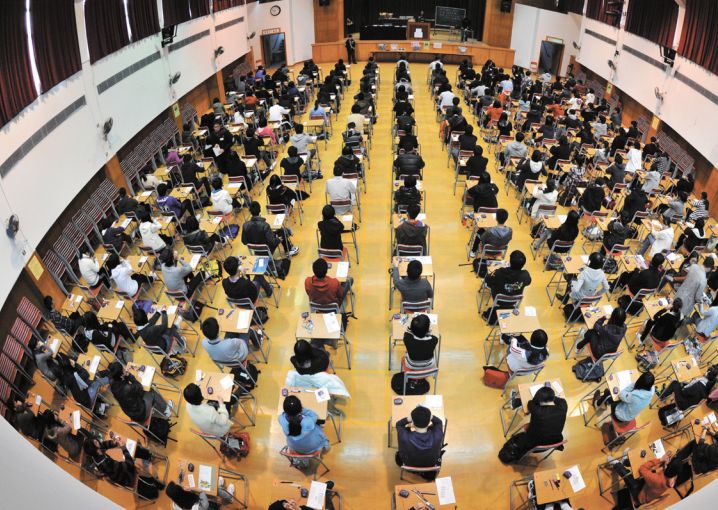Heartbreaking article the other week about examination stress. Apparently since the Diploma of Secondary Education came into full flowering in 2012 about 71 students in the relevant age group have eluded the examiners by killing themselves.
The writer, who still had fresh memories of passing the ordeal herself, thought this was shocking, and so do I.
It is always difficult to be sure of the motives of people who commit suicide, and there is a tendency for one reported case to inspire imitation. Even so, I remember the days when a toll of one or two suicides in an examination season was considered bad news. We are now, it seems, running a rate of something over ten a year.

The writer noted that the DSE, compared with other similar exercises, lacks continuous assessment. That is to say, your final score depends entirely on the two weeks of frantic writing at the end of the course. There is no credit for school work done earlier.
She also noted that in Hong Kong the DSE was practically the only input used by universities in admissions decision-making. That, I can confirm, is certainly the case.
When four-year degrees arrived, the committee of university heads decided (this was not a necessary feature of the new system) to abandon the old arrangement by which a course selected its own students. In future admission would be by faculty or school.
This means that anyone working on admissions is faced with a crowd of thousands from whom they have to pick a hundred or two. No detailed consideration is possible. The exam score is effectively all there is. The only other indicator of any interest is the student’s choice.
I remember several attempts to float scoring systems for extra-curricular activities, with bonus points ranging from – say – one for doing a Red Cross flag day up to ten for an Olympic medal. None of these came out as very convincing and I don’t think anyone is using one now.
There is also the familiar point that a university degree means less now than it did in the days when it was a rarity. The unfortunate consequence of this is that employers who really do not need people with a university degree still use it as a way of reducing their pool of applicants to a manageable size. If you haven’t got one your application is rejected out of hand.

This leads to the suspicion that – as one of Michael Moore’s interviewees puts it in Bowling for Columbine – if you don’t graduate you will die poor and lonely. Your future – not to mention your parents’ happiness – is at stake in the DSE and failure to meet expectations is a major personal catastrophe.
I do not, I must say, remember similar angst over the corresponding examinations through which I plodded many years ago. The writing was all done in two or three weeks – continuous assessment had not been invented – and we had to do the whole thing twice (it was called O and A Levels).
It may be that as a sort of supergeek for whom examinations came easily I missed symptoms of tension in my classmates. But there is not much privacy in a boarding school.
Then maybe we were let off the hook by the 11 plus. This was an exam (which was supposed to be a mere “IQ test”) taken at the end of primary education. It may have caused some stress, but most of us were too young to take it that seriously, and at least the stress did not coincide with teenage turmoil.
Those who took the exam were then allocated either to Grammar Schools (this outcome was familiarly described as “passed”) or to Secondary Modern Schools, which were noticeably less affluent and prestigious (“failed”). There was supposed to be a third category of Technical Schools for the NCOs of industry, but few of these actually appeared.
Everyone in my school had, by definition, “passed” the 11 plus. So we may subconsciously have thought that we already had Business Class tickets for the 747 of life. Getting into university was still very unusual. For most of us it was hoped for but not expected.
Perhaps, raised on the stories of our parents’ privations in World War Two, we set the bar for complaints a bit higher than it is set now. Employers, anyway, rarely insisted on a degree. Many professions which now require a degree, including the Law and journalism, still admitted most of their recruits fresh from school.

This absence of stress at school was more than compensated by a surplus at university. The one I attended offered an idyllic existence for three years. You then had a week of “Finals” which was rather reminiscent of that legendary Chinese examination in which candidates for the civil service were shut up in a room for a week and told to write down all they knew.
We had six hours of exams on Wednesday, Thursday, Friday and Saturday, Sunday off, six hours on Monday and a last burst on Tuesday morning, after which there was an understandable tendency for the exhausted examinee to get resoundingly drunk.
An oddity I noticed on arrival was that all student rooms had brand new electric fires. This was because the university had decreed, after a spate of student suicides using gas, that all gas fires should be replaced with something less obviously lethal. This was a success. Nobody killed him or herself while I was there. Some people continued to get special dispensation to take their Finals in the local mental hospital.
In small colleges there was constant vigilance. I remember the Dean of my place, seeing me sitting on the steps of a church (I was waiting for a friend) drew disturbing conclusions about my state of mind. He stopped his car in the middle of the street, ignored the ensuing hoots of outrage from other motorists and ran across to ask if I was alright.
At the University of London I heard of an odious arrangement in some of the more sought-after science programmes. They would admit about 20 per cent more students to the first year than they had places for in the laboratory subjects which started in the second. At the end of the first year the bottom 20 per cent in the pecking order were simply expelled. The results of this can be imagined.
One of my first attempts at journalism was a column in a student publication at the University of Lancaster drawing attention to two recent attempts at suicide (both, fortunately, half-hearted and unsuccessful) and wondering if exam stress could be reduced as this seemed to be a cause.

I then got a polite hand-written letter from the Vice Chancellor saying that he was willing to try anything, but reducing the significance of exams appeared to be not so much a way of reducing stress as a way of spreading it over a longer period.
We discussed the matter further and agreed that a student counselling service was a good idea. As I was the student union president at the time this proposal was sure of a favourable wind from several directions and materialised rather quickly. I do not know if it helped.
And this gets us back to where we started. Yes, the DSE is a stressful experience which some victims do not survive. But what would help?
I suppose there is no practical objection to spreading the exams over, say, four weeks instead of two. Would that reduce stress or spread it out?
Using continuous assessment of school work is a big ask because it puts teachers in a complicated situation. How much help is permissible; how much benevolent marking do their pastoral obligations require?
It seems also that while the student whose continuous assessment is successful can comfort himself with the thought that he enters the exam room with some money in the bank, as it were, the student who is less successful in term time may find the exam an even more onerous and frightening ordeal than if he was allowed to start from scratch.

Counselling can help, and a lot of people now offer it. I fear those who most need it are the least likely to ask.
The unlikely reform which I think would help is giving more thought to the idea that the entire student population should take the same exam. The consequence of this is a large group of candidates entering the examination room knowing that their chances of passing are minimal or non-existent.
A further large group in the same boat may not realise this until they see the actual questions. When I took the French Oral exam (a one-to-one chat with visiting examiner) we were admitted in alphabetical order. The first person out was besieged by an eager crowd asking what the examiner had wanted to talk about. Unfortunately this boy was not a strong candidate. “I don’t know,” he said, “she was talking in a foreign language.”
Seriously, though, the business of preparing people for an arbitrary and unnecessary encounter with failure is gratuitously cruel. There may be something in the idea that those who aspire to life’s glittering prizes should be willing to suck it up and tough it out on occasion.
The rest of us do not need to be prepared for a seat at the back of the bus. Life will provide us with as many examples of failure and rejection as a sane person needs. We do not need an extra dollop from the education system.
If you are experiencing negative feelings, please call: The Samaritans 2896 0000 (24-hour, multilingual), Suicide Prevention Centre 2382 0000 or the Social Welfare Department 2343 2255. The Hong Kong Society of Counselling and Psychology provides a WhatsApp hotline in English and Chinese: 6218 1084. See also: HKFP’s comprehensive guide to mental health services in Hong Kong
